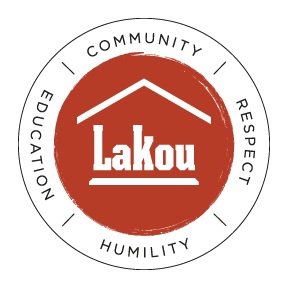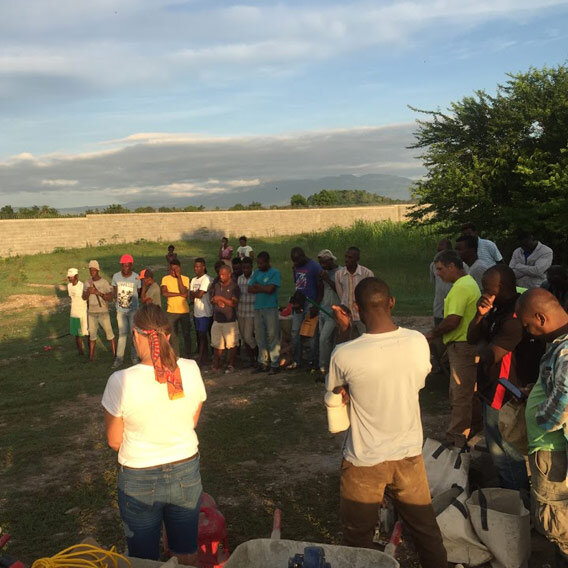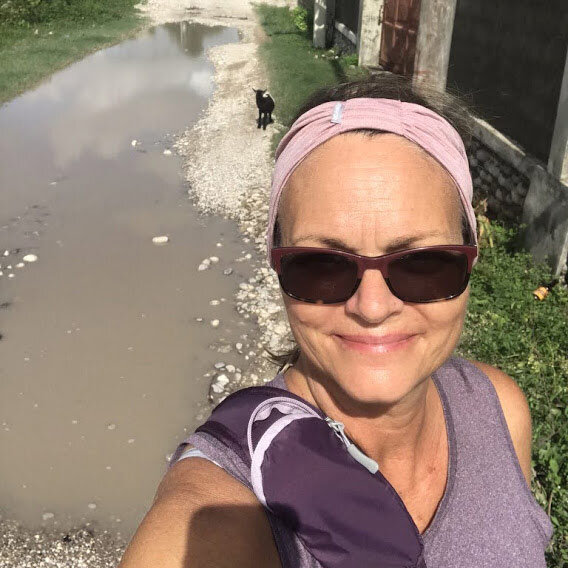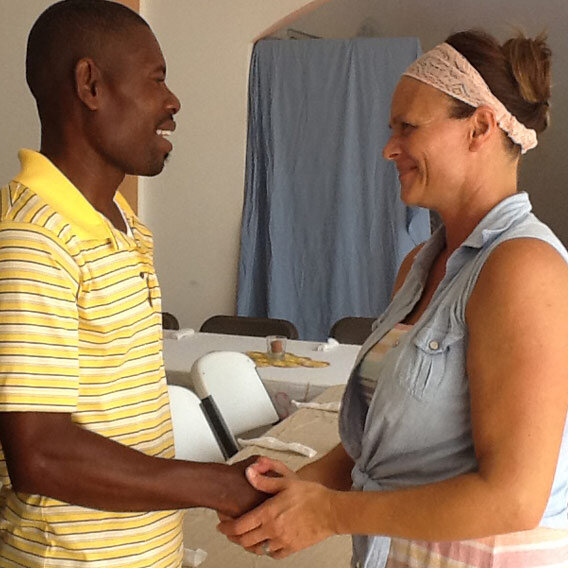Listening and being proximate / Koute epi raproche
I needed to be proximate to the community I wanted to help.
When we first came to Haiti 7 years ago, I was out driving with Maxon one morning when we passed a small tin shack. I was told that the shack belonged to one of our Lakou participants, and that he lived there in one room with his wife and seven children.
You could imagine my first reaction! I told Maxon we need to build him a house! I’m sure we can fundraise to get the money, and take care of this family right away. This is a problem we can fix, and fix it now!
I was surprised by Maxon’s reaction. He said, “If you do that, you would cause SO many problems.” Shocked, I asked why? Why would solving this problem for this family in need do anything but help? He patiently explained to me how complicated this would be. Who decides who receives a new house and who doesn't? Which families are deserving? What makes this family different from all of the other families?
I thought about this. As Americans, we often go to new and different places where we witness profound need and want, and we want problems fixed now. We have the means to solve this problem, how could that cause hurt? But without working to understand a community, our good intentions often cause problems we didn't anticipate.
Bryan Stevenson describes the solution to this as “getting proximate.” In his speech, “Four Steps to Change the World,” this is the first step you must take to make real change. “We’ve got to find ways to get closer to the poor, the neglected, the abused, the excluded, the marginalized, because it’s in proximity to these communities that we hear things that we will not otherwise hear; we will see things that we will not otherwise see,” Stevenson explained.
I needed to be proximate to the community I wanted to help. I needed to listen to their ideas for solutions and not impose my own. I did not fully understand the nature of this problem, and my “solution” would have caused more harm than good because of my lack of understanding and my rush to “get something done.”
Haitians understand their community and one another better. This seems like an obvious point, but it is one that Americans often miss. I’ve never gone without food. I’ve never lived in a one room tin shack. The more we can listen to one another; the more we can understand each other. This is how Lakou can be supportive.
At Lakou, we want to be a place to bring voices together, where people feel heard and respected. Problems can be solved when everyone is a part of the discussion and everyone is equal. No one is above any other. This is the very definition of Lakou!
7 lannen pase lè nou rantre an Haiti, yon maten pandan mwen t'ap kondi ansanm ak Maxon nou te pase devan yon gwo bwat an eten. Yo te di'm bwat sa a se pou youn nan patisipan nou yo ki fè pati de Lakou, epi misye t'ap viv nan yon chanm ak madanm li epi 7 pitit.
Ou ka imajine premye reyaksyon'm! Mwen di Maxon ke nou dwe konstwi yon kay pou li! Mwen asire ke nou ka jwenn fon pou nou jwenn lajan, epi okipe nou de fanmi sa a touswit. Sa a se yon pwoblèm ke nou dwe rezoud, epi rezoud kounye a!
Mwen te sezi wè jan Maxon te reyaji. Li te di: << Si ou fè sa, w'ap koze anpil problèm.>> Choke, mwen te mande poukisa? Poukisa rezoud problèm sa a pou fanmi sa a ki nan bezwen t'ap fè lòt bagay ke ede? Li te pran pasyans pou'l explike'm kijan sa t'ap konplike.Ki moun ki deside ki moun ki resevwa yon kay tou nèf epi ki moun ki pa deside? Ki fanmi yo ki merite? Kisa ki distenge fanmi sa a de tout lòt fanmi yo?
Mwen te panse a sa. Kòm Ameriken, nou ale souvan nan kèk andwa nouvo epi diferan kote nou temwen de bezwen ak kèk souwè profon, epi nou vle pou problèm yo rezoud kounye a. Nou gen mwayen pou nou rezoud problèm sa a, kouman sa te ka fè mal? Men san nou pa travay pou konprann yon kominote, bon entansyon nou yo koze dè problèm ke nou pat prevwa.
Bryan Stevenson dekri solisyon pou sa tankou << Vin pi pre.>> Nan diskou'l, << Kat etap pou chanje mond lan>>, se premye etap ke ou dwe fè pou fè de chanjman reyèl. << Nou dwe jwenn kèk mwayen pou nou aproche pi pre pòv yo, moun sa a yo ki neglije, sa a yo ki maltrete, sa a yo ki exkli, sa a yo ke sosyete a mete akote, paske se prè kominote sa a yo ke nou tande kèk bagay ke nou pa tap tande otreman; nou ap wè dè bagay ke nou pa tap wè otreman>>, Stevenson explike.
Mwen te bezwen pre kominote sa a ke mwen te vle ede. Mwen te bezwen koute ide solisyon yo te genyen epi pou'm pat enpoze ide solisyon pa'm. Mwen pat byen konprann nati problèm sa a, epi << solisyon'm lan>> t'ap koze plis mal ke byen akòk mwen te manke konprann epi'm te prese pou'm << fè kichòy>>.
Ayisyen yo konnen youn lòt ak kominote yo pi byen. Sa sanble yon bagay klè, men se yon pwen ke ameriken yo manke souvan. Mwen pa janm pa gen manje. Mwen pa janm abite nan yon kay yon sèl pyès. Plis nou ka koute youn lòt; plis nou ka konprann youn lòt. Se konsa Lakou ka favorab.
Nan Lakou, nou vle yon plas ki rasanble vwa yo, kote moun santi yo tande yo epi respekte yo. Problèm yo ka rezoud lè tout moun fè pati diskisyon an epi tout moun egal. Pa gen yon moun ki sou tèt lòt. Sa a se sa Lakou vle di menm!
Jodi a, patisipan nou an konstwi yon kay an mason ak konesans ke'l aprann nan fòmasyon an konstriksyon ke nou ap bay, epi ak lajan ke'l fè gras a travay di sou chantye. Plis Lakou koute, aprann epi bay a patisipan nou yo konfyans yo bezwen pou rezoud problèm yo, plis nou ap soutni yon chanjman reyèl epi dirab.




